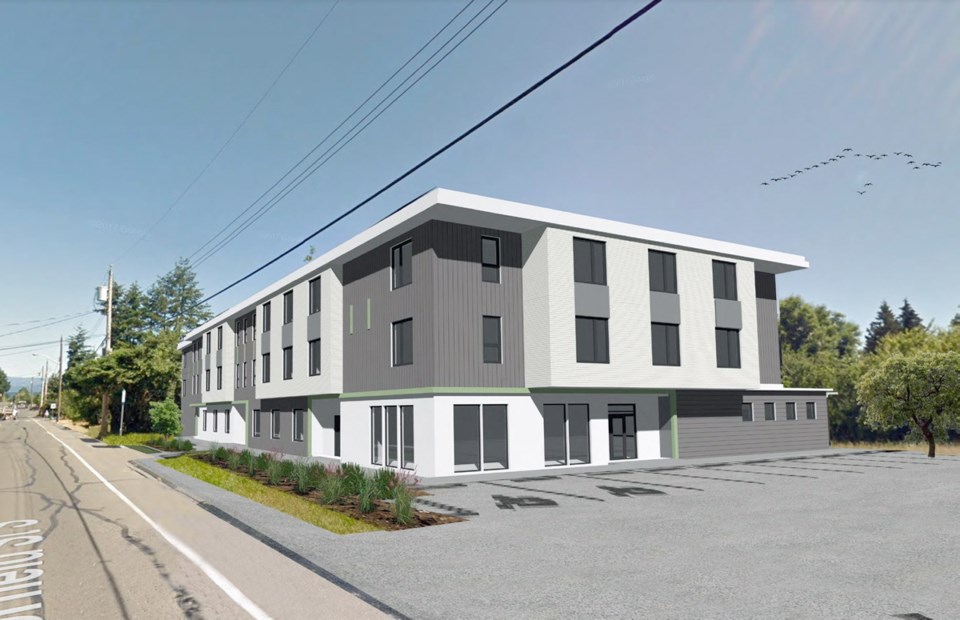Citing risks to its future residents and employees from a neighbouring supportive-housing complex, Berwick Retirement Communities has cancelled a $52-million seniors-residence project in Parksville.
Excavation and concrete pouring for the 188-unit residence, which has been on hold since last summer when the company learned of the supportive-housing project, was to have started this summer.
“It’s a huge disappointment — we were looking forward to it,” said Berwick founder Gordon Denford in an interview. “The last thing we wanted is where we are at today. But the risk is too great to our seniors, our future residents and our employees.”
Denford said the Orca Place supportive-housing project, under construction across the street from the proposed Berwick site on the edge of the city centre, will cater to the drug-addicted and mentally ill, who bring myriad issues.
“[It] is totally incompatible with a large residence that is home to approximately 250 vulnerable seniors, along with approximately 150 full- and part-time employees and a daycare for 30 of their preschool children,” he wrote in a statement to Parksville council.
Orca Place, a $6.9-million housing project funded by B.C. Housing, will be home to 52 residents who are homeless or at risk of homelessness, and who are seeking help for problems such as mental-health issues and substance abuse.
Parksville Mayor Ed Mayne, who has his own concerns about Orca Place, said losing Berwick is a major disappointment. He noted the project meant 150 jobs, tax revenue and development cost charges of more than $2.5 million, to be split with the regional district.
Coun. Adam Fras said he is not surprised Berwick pulled the plug.
“This is what Berwick said they would do. They had concerns about building next to supportive housing. It’s unfortunate, yes, but they are acting with integrity,” he said. “It’s sad to lose out on something like this.”
Denford said on top of the risk to residents, there was a financial risk for the partners — Berwick and landowner Revera — as the supportive-housing situation would mean difficulty in leasing out the 188 units had the seniors project gone ahead.
Denford said the company canvassed seniors living at Berwick’s seven other residences and their families, and heard they would be reluctant to move to the Parksville facility, given the presence of Orca Place.
Many Parksville residents and members of council had pushed to limit the services offered at the supportive-housing complex, including restricting the residences to people over the age of 45, as has been done in other places where supportive housing caused concern.
But in the end, the only changes were removal of a planned cold-weather shelter and related food service.
To mitigate its financial risk, Berwick asked Parksville for breaks on development cost charges and property taxes.
“We’re not looking for a handout,” said Denford. The company had incurred costs because the project was on hold, and has spent more than $1 million in design and pre-construction work, he said.
But Mayne said even if it might have saved the project, tax breaks and waiving fees were a non-starter. “We know what we’re losing here, but we can’t do what they want us to do,” he said, noting the seniors residence does not meet any of the criteria that would allow the city to waive fees or defer taxes. “We can’t arbitrarily just waive development-cost charges.”
Fras suggested some of the blame has to go to B.C. Housing.
“The message is that these are the risks that come with supportive housing, and the losses to communities that happen when you don’t consult with the community properly — you lose out on these homes and these jobs,” he said. “It takes B.C. Housing really listening to how this impacts communities. They are constantly telling us [supportive housing] doesn’t affect home prices, doesn’t affect crime, doesn’t affect this and that, but here is a very real loss to a community that comes out of these supportive-housing units.”



